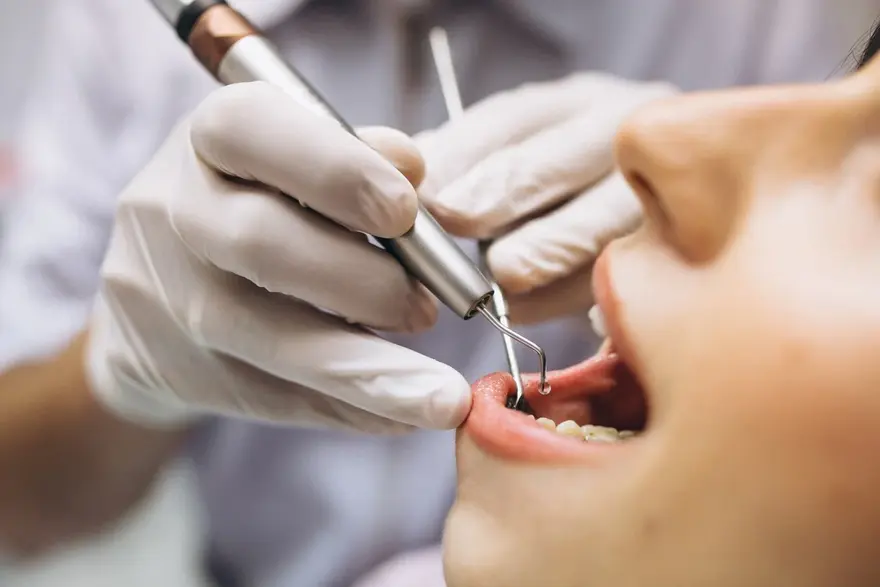Health Wellness
Typhoid Fever: Symptoms, Causes, Stages & How Long Does it Last?
661788 Views
0

What is Typhoid Fever?
Typhoid fever is an infection caused by Salmonella Typhi, affecting the small intestines and resulting in high fever and abdominal pain. Known as enteric fever, it is prevalent in developing countries with inadequate sanitation. Distinguishing typhoid fever from paratyphoid fever or salmonellosis is crucial, as they involve different bacteria. Knowing typhoid causes, symptoms, and treatment options is vital for effective management.
Typhoid is one of the most common intestinal (enteric) infections known to mankind. An estimated 11–21 million cases of typhoid fever and 200,000 deaths occur worldwide annually. An estimated 5 million cases of paratyphoid fever occur worldwide each year, with the highest number of cases in Southeast Asia.
Typhoid fever is a disease that spreads through contact with affected persons or by ingesting or drinking contaminated substances. It is caused by Salmonella typhi. Common symptoms of typhoid fever include stomach cramps, nausea, vomiting, and high body temperature.
If typhoid fever is caught early, medications can be highly effective. Typhoid has a high mortality rate in cases of delayed treatment.
Beware.. the monsoon season may exacerbate typhoid. Experiencing symptoms suggestive of typhoid? Book your Typhoid Serum Test.
Who does Typhoid Fever affect?
Although anyone can contract typhoid fever, children are more susceptible than adults. It's also more prevalent in South Asia countries like India, Bangladesh, and Pakistan — posing a significant risk for travellers visiting these regions.
How Common is Typhoid Fever?
Every year, 11-21 million people globally get typhoid fever, highlighting the importance to recognize its symptoms, especially in India, where poor sanitation leads to many cases.
What’s a long-term Carrier of Typhoid Fever?
Some people can still carry and spread typhoid fever after getting better, often without any symptoms for more than a year. This shows how important it is to regularly test for S. Typhi in those who have recovered, to prevent further outbreaks and keep communities safe and healthy.
What’s the Difference Between Typhoid and Typhus?
When talking about the different types of typhoid, it’s important to consider both typhoid fever and paratyphoid fever, as they are two distinct illnesses with different causes and symptoms.
- Typhoid fever is mainly caused by the bacteria Salmonella Typhi, leading to severe symptoms that can be very severe. These symptoms includes high fever, intense stomach pain, and serious gastrointestinal problems.
- On the other hand, paratyphoid fever which is caused by Salmonella Paratyphi (S. Paratyphi) and usually has milder symptoms. These may include a low-grade fever, headache, and fatigue. While paratyphoid fever is often less serious, it still needs medical attention to prevent complications and ensure a full recovery for those affected.
What are the Symptoms of Typhoid Fever?
As typhoid is an enteric infection, it affects the intestine and hence, the typhoid symptoms one experiences are related to digestion. Generally, the signs and symptoms of typhoid fever start showing up gradually over a period of 10-14 days after exposure to the bacteria. The duration of the typhoid illness is about 3-4 weeks. Some signs and symptoms of typhoid fever which indicate you might be infected with the condition include:
- Irregular fever that can go as high as 104.9 ˚F (40.5 ˚C)
- Headache
- Pain in the abdomen
- Feeling of tiredness and weakness
- Muscle pain
- Loss of appetite/anorexia
- Nausea and vomiting
- Constipation or diarrhea
- Without treatment, typhoid fever may last a month or more and become very serious, even life-threatening.
Fever can occur due to various other infections as well. Do not rely on guesswork and get yourself tested. Book a fever panel package and check for 5 diseases at one go.
What are the Causes of Typhoid Fever?
Typhoid fever is a serious and sometimes life-threatening infection that mostly affects people in developing countries, where sanitation is poor and getting clean water is a problem.
Typhoid is caused by a bacterium called Salmonella typhi which is also related to the Salmonella bacteria that results in food poisoning. It is transmitted when a person eats or drinks something contaminated with the bacteria. When the bacteria get into the body, it quickly multiplies and spreads into the bloodstream.
There are certain factors which can elevate the risk of typhoid fever. These include:
- Traveling to areas where typhoid fever is common (endemic areas).
- Being in a profession where exposure to the bacteria is likely, for example, those working in hospitals and laboratories.
- Coming in close contact with a person suffering from typhoid.
How Do People Get Typhoid Fever?
Typhoid fever is spread by the consumption of unhygienic food or water. Acutely unwell patients pose a threat to the water supply because their faeces contain a high quantity of germs. Because water is used to grow, process and transport food, any contamination of that water might poison the food itself.
After recovering from a severe infection, between 3 and 5% of people continue to have the bacterium.
Some people have undetected, minor illnesses. These people are at risk of becoming chronic carriers of the disease. Bacteria populate the intestine after multiplying in the liver, bile ducts, or gallbladder. This bacteria may live in water or dry sewage for weeks. These asymptomatic chronic carriers may be the cause of future typhoid epidemics.
Does Typhoid Spread by Kissing?
Typhoid does not spread through kissing, despite some misconceptions. However, if an infected person neglects hygiene after using the bathroom, they can leave bacteria on surfaces, which may then be transmitted to others who touch those surfaces.
What are The Stages of Typhoid Fever?
If you have typhoid, you might be wondering when you’re going to feel better. But there’s not just one answer because there are different stages of typhoid fever.
There are 4 Stages of Typhoid Fever or enteric fever and each lasts up to a week.
The First Stage
In this typhoid stage, the patient experiences some of the preliminary typhoid symptoms such as dry cough, indolence or headache. This may or may not be accompanied with fever. Even if fever occurs, your body temperature will not be much higher than normal.
The Second Stage
During this typhoid stage, fever runs high and the stomach becomes bloated. Weight loss is another significant sign of this stage. Hallucinations or fever dreams are common. The person might feel lethargic and agitated in alternation.
The Third Stage
This is the stage when things get really serious. Severe intestinal perforation may cause abdominal haemorrhage. Encephalitis or inflammation of the brain may set in. The person may become dehydrated which increases the intensity of the delirium. The person faces difficulty in sitting up, let alone standing or walking.
The Fourth Stage
This typhoid stage is characterized by extremely high fever. It brings along several other health complications including severe infections, kidney failure, pneumonia, inflammation of the pancreas or Meningitis.
In some people, the bacteria that causes typhoid can remain in the body for a prolonged period of time. According to Centers for Disease Control and Prevention (CDC), it is estimated that between 1% and 4% of treated patients still excrete Salmonella typhi bacteria in their feces 12 months or more after they are ill with typhoid. A long course of antibiotics is necessary to get rid of the typhoid bacteria in these people.
Some people who are treated for typhoid fever also experience a relapse, which is when symptoms return. In these cases, the symptoms usually return around a week after antibiotic treatment has ended. The second time around, symptoms of typhoid are usually milder and last for a shorter time than the original illness, but further treatment with antibiotics is usually recommended. It is best to consult your doctor as soon as possible if your symptoms return post the treatment.
How is Typhoid Fever Diagnosed?
If you experience any signs and symptoms of typhoid fever, it is wise to consult a doctor, who will do a physical examination and order a few tests to diagnose the condition. Physical findings in early stages point to abdominal tenderness, enlarged spleen and liver, enlarged lymph nodes, and development of a rash (also known as rose spots because of their appearance). Your medical provider may ask for a few laboratory investigations as follows:
What Tests Can Be Done To Diagnose Typhoid Fever?
- Blood tests to detect IgM and IgG antibodies and blood culture test to detect the bacteria Salmonella typhi.
- Stool and urine analysis to check for the presence of the bacteria.
- Widal antigen test is a simple, inexpensive test and takes only a few minutes, but there is a longer waiting phase of about 10 days till results can be seen. The conventional Widal test detects antibodies to the bacteria from week-2 of onset of symptoms.
- Typhi dot tests can serve as a marker for recent infections and can detect early rising antibodies that are predominantly IgM.
- Bone marrow culture is also recommended but it is rarely required except in patients who have already received antibiotics and whose condition doesn’t seem to improve. It is one of the most sensitive tests for typhoid fever.
Monsoon May Increase the Chances of Gut Infections
As typhoid is quite common during monsoon due to high chance of water and food contamination, is it advised to keep note of any symptoms and get tested early on time. Also, if anyone in your family suffers from the condition, it is important to follow all the necessary hygiene and sanitation protocols.
How is Typhoid Fever Treated?
For the signs of recovery from typhoid fever to show, antibiotics are recommended by doctors. If caught early, the infection is typically relatively manageable, and a 7- to 14-day course of antibiotic pills will do the trick.
To administer antibiotic injections for more severe instances of typhoid fever, hospitalisation is typically required.
Most patients will feel better after taking antibiotics for only a few days, and severe problems almost seldom occur. Nowadays, typhoid-related deaths in India are extremely rare.
Despite this, it is believed that up to one out of five persons infected with typhoid fever may perish if they do not receive treatment, and some of those who do survive may be left with severe physical or mental problems.
What are The Signs of Recovery from Typhoid Fever?
Signs of recovery from typhoid fever are here:
- Restored appetite
- Nobody pains, including headaches and stomach aches
- Normal body temperature (i.e., no fever)
- Diminished fatigue
- Reduced diarrhoea
- No chest congestion
What Medications are Used to Treat Typhoid Fever?
Vaccination is vital for preventing typhoid fever, especially in areas where it's common. Although antibiotics like ciprofloxacin, ceftriaxone, and azithromycin are effective, the rise of antibiotic resistance, including extremely drug-resistant (XDR) Salmonella Typhi, complicates treatment. Therefore, vaccination is essential for reducing cases and protecting individuals from severe illness.
How Do I Take Care of Myself with Typhoid Fever?
Following a diagnosis, it's important to complete all prescribed medications and discuss safe home care strategies with your healthcare provider. Recovery usually starts within a few days after treatment begins, but full recovery can take up to 10 days, depending on individual health circumstances and factors.
How can I Reduce My Risk of Typhoid Fever?
The best way to prevent typhoid fever is through vaccination, especially if you live in or plan to travel to risk prone areas. Additionally, practicing proper hand hygiene and safe food handling, such as washing hands frequently and consuming well-cooked meals, can significantly reduce your risk of infection.
Vaccines for Preventing Typhoid Fever
Typhoid fever can be effectively prevented through vaccination, which is great news for public health. There are two main types of vaccines available for Typhoid fever: injectable and oral. These vaccines help the body develop immunity against the bacteria that cause typhoid. While they significantly reduce the risk of infection, adhering to strict hygiene practices is essential to minimize chances of contracting the disease.
This includes regular handwashing, safe food preparation, and access to clean drinking water. Even after vaccination, maintaining good hygiene is crucial, particularly in areas where typhoid is more common. Communities must prioritize both vaccination and hygiene to combat the disease effectively. By combining these approaches, individuals can lower their risk of typhoid fever, protecting themselves, their loved ones, and their communities. Awareness and education are vital in promoting these preventive measures for a healthier future.
Safe Food Practices for Preventing Typhoid Fever
In addition to receiving vaccinations, adopting safe food practices is crucial for effectively preventing typhoid. One of the most important measures is maintaining proper hand hygiene before every meal, as this simple habit helps eliminate harmful bacteria that can lead to infection. Drinking purified or boiled water is equally vital, as it reduces the risk of contamination often found in untreated sources.
Furthermore, it’s wise to avoid consuming uncooked food from street vendors, as these items are more likely to carry pathogens. By incorporating these practical strategies into your daily routine, you can significantly enhance your protection against typhoid. These precautions not only safeguard your health but also contribute to overall well-being, allowing you to enjoy your meals without worry. Embracing these healthy habits is a proactive approach to preventing foodborne illnesses.
What can I Expect If I have Typhoid Fever?
If you’re diagnosed with typhoid fever and start treatment quickly, you should begin to feel better in just a few days. However, it’s very important to complete all your prescribed medicine, even if your symptoms fades.
Stopping early can lead to a relapse or other health issues. Typhoid fever can be serious, so completing your treatment ensures the infection is completely gone. Make sure you drink plenty of fluids and get enough rest. Follow your doctor’s instructions to help you recover fully and prevent spreading the illness to others.
Typhoid Relapse
In some cases, people might experience a relapse of symptoms after seeming to recover completely from typhoid fever. If you notice recurring typhoid symptoms, it's essential to reach out to your healthcare provider immediately.
It’s crucial to seek prompt care to address any potential relapse and effectively manage your condition. Being attentive to your health can help reduce the risk of complications and promote an easier recovery. Always prioritize discussing any concerns with your healthcare provider.
What are the Complications of Typhoid Fever?
If typhoid fever is not treated promptly or if there are delays in treatment, it can result in serious complications such as internal bleeding, intestinal perforation (a rupture in the intestines), and neurological issues like confusion and seizures.
Early diagnosis and treatment are important to prevent these potentially life-threatening complications, as untreated typhoid may also lead to extended illness, increased medical expenses, considerable suffering, and lasting health effects.
How Long does Typhoid Fever Last?
The duration of typhoid fever typically ranges from 7 to 10 days when treated promptly. However, if left untreated or if treatment is delayed, it can extend to 3 weeks or longer, significantly increasing the risk of serious complications and long-term health problems for patients.
Is Typhoid Fever Fatal?
Yes, typhoid fever can be fatal if not treated promptly. However, with modern medicines and early intervention, most patients survive and recover fully. This emphasizes the critical importance of timely diagnosis and effective treatment to prevent serious complications and health outcomes.
When can We Go back to Work or School After Having Typhoid Fever?
Returning to work or school after recovering from typhoid fever depends on individual circumstances. It’s important to check with your employer or school about any specific policies and requirements. In some cases, a negative test for S. Typhi may be required before you can safely resume normal daily activities and responsibilities.
Can You Still Be Contagious With Typhoid Fever After You Get Better?
Yes, it’s possible to still be contagious even after recovering from typhoid fever. This condition is called being a long-term carrier.
Therefore, it's important to get tested even after recovery to ensure you’re not spreading the infection to others, helping protect everyone’s health and preventing future outbreaks effectively and safely in your community and beyond, including vulnerable populations and those at higher risk.
When Should I See My Doctor About Typhoid Fever?
You should consult your doctor if you experience a persistent fever, abdominal pain, nausea, or any other severe symptoms associated with typhoid fever. Early medical attention is crucial for proper diagnosis, effective treatment, and recovery.
How Did Countries Get Rid of Typhoid Fever?
The incidence of typhoid has greatly reduced in many countries due to modern sanitation practices. Providing clean water for cooking and drinking has helped control the spread of this disease, improving public health for communities and enhancing people’s overall quality of life.
Conclusion
Early diagnosis is key to effective treatment for typhoid fever. Antibiotics are the only way to cure typhoid. It can be deadly if caught too late. Get yourself tested for typhoid fever if you notice its symptoms growing in your body.
Though typhoid can pose serious health risks, early diagnosis and proper treatment enables most of the individuals to recover completely. Being informed is essential for managing your health.
With Metropolis Healthcare's expert diagnostic services and focus on patients, you can access reliable pathology tests and comprehensive health check-ups tailored to your needs. Take charge of your health and well-being with Metropolis Healthcare’s support today for a healthier future.























 WhatsApp
WhatsApp